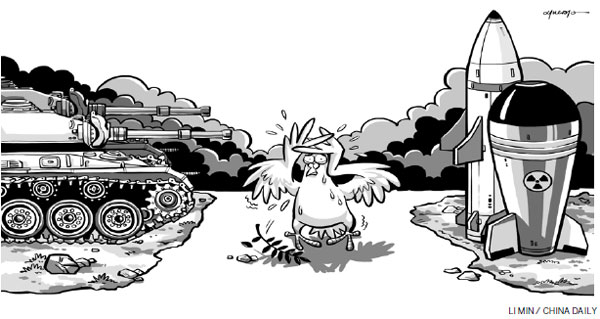Region needs to work for Peninsula stability
By Wang Xiaobo (China Daily) Updated: 2015-03-03 08:03

Given that their dominant role in the peninsula's security will directly determine its security trend, China and the US should strengthen mutual coordination and communicate on issues related to the Korean Peninsula in a bid to avoid any strategic misjudgments and realize pragmatic dialogue and cooperation. This, together with their consensus that peaceful means should be employed to respond to crises will lay an important foundation for stability on the peninsula. Improved relations between the DPRK and the ROK, especially alleviated tensions in their military and security ties, will significantly influence big countries' strategies toward the peninsula and thus help the security situation.
The Cold War legacy and the lack of mutual trust between the parties concerned are the crux of the Korean Peninsula issue. The regular US-ROK military exercises and the rhetoric of threat from the DPRK in response have increased the risk of a strategic misjudgment, a military conflict, even a nuclear incident.
To promote peace and stability on the Korean peninsula, Northeast Asian countries should take joint action and drive home the perception that peaceful coexistence is the only way to achieve a lasting solution. With such a consensus, they should try to push forward coordination and cooperation through dialogue and if necessary make some compromises.
The current strained situation on the Korean Peninsula would be eased if the US and the ROK reduced and finally stopped their military drills that posit the DPRK as an enemy and Pyongyang puts a moratorium on and finally abandons its nuclear tests. Increased cooperation between the DPRK and the ROK via the reunion of separated family members, and humanitarian aid and disaster relief will also help substantially improve bilateral ties. At the same time, active bilateral and multilateral cooperation and interaction among Northeast Asian countries will contribute to the creation of a positive atmosphere for reconciliation between the DPRK and the ROK.
The author is a professor with the Institute of Politics and Public Administration, Yanbian University.

I’ve lived in China for quite a considerable time including my graduate school years, travelled and worked in a few cities and still choose my destination taking into consideration the density of smog or PM2.5 particulate matter in the region.











